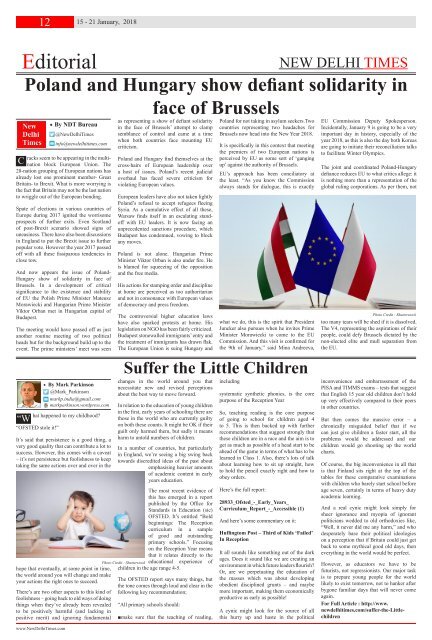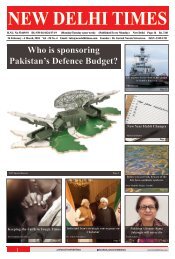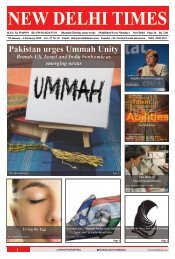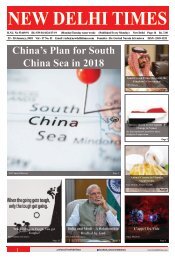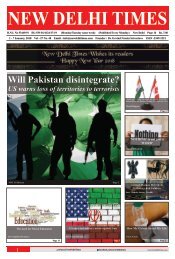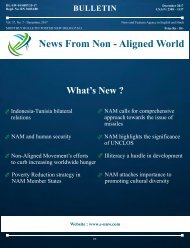15-21 January 2018 - 16-min
Create successful ePaper yourself
Turn your PDF publications into a flip-book with our unique Google optimized e-Paper software.
12<br />
<strong>15</strong> - <strong>21</strong> <strong>January</strong>, <strong>2018</strong><br />
C<br />
Editorial<br />
“W<br />
www.NewDelhiTimes.com<br />
◆◆By NDT Bureau<br />
@NewDelhiTimes<br />
info@newdelhitimes.com<br />
◆◆<br />
By Mark Parkinson<br />
@Mark_Parkinson<br />
markp.india@gmail.com<br />
markparkinson.wordpress.com<br />
NEW DELHI TIMES<br />
Poland and Hungary show defiant solidarity in<br />
face of Brussels<br />
racks seem to be appearing in the multination<br />
block European Union. The<br />
28-nation grouping of European nations has<br />
already lost one pro<strong>min</strong>ent member- Great<br />
Britain- to Brexit. What is more worrying is<br />
the fact that Britain may not be the last nation<br />
to wriggle out of the European bonding.<br />
Spate of elections in various countries of<br />
Europe during 2017 ignited the worrisome<br />
prospects of further exits. Even Scotland<br />
of post-Brexit scenario showed signs of<br />
uneasiness. There have also been discussions<br />
in England to put the Brexit issue to further<br />
popular vote. However the year 2017 passed<br />
off with all these fissiparous tendencies in<br />
close tow.<br />
And now appears the issue of Poland-<br />
Hungary show of solidarity in face of<br />
Brussels. In a development of critical<br />
significance to the existence and stability<br />
of EU the Polish Prime Minister Mateusz<br />
Morawiecki and Hungarian Prime Minister<br />
Viktor Orban met in Hungarian capital of<br />
Budapest.<br />
The meeting would have passed off as just<br />
another routine meeting of two political<br />
heads but for the background build up to the<br />
event. The prime <strong>min</strong>isters’ meet was seen<br />
hat happened to my childhood?<br />
“OFSTED stole it!”<br />
It’s said that persistence is a good thing, a<br />
very good quality that can contribute a lot to<br />
success. However, this comes with a caveat<br />
– it’s not persistence but foolishness to keep<br />
taking the same actions over and over in the<br />
hope that eventually, at some point in time,<br />
the world around you will change and make<br />
your actions the right ones to succeed.<br />
There’s are two other aspects to this kind of<br />
foolishness – going back to old ways of doing<br />
things when they’ve already been revealed<br />
to be positively harmful (and lacking in<br />
positive merit) and ignoring fundamental<br />
as representing a show of defiant solidarity<br />
in the face of Brussels’ attempt to clamp<br />
semblance of control and came at a time<br />
when both countries face mounting EU<br />
criticism.<br />
Poland and Hungary find themselves at the<br />
cross-hairs of European leadership over<br />
a host of issues. Poland’s recent judicial<br />
overhaul has faced severe criticism for<br />
violating European values.<br />
European leaders have also not taken lightly<br />
Poland’s refusal to accept refugees fleeing<br />
Syria. As a cumulative effect of all these,<br />
Warsaw finds itself in an escalating standoff<br />
with EU leaders. It is now facing an<br />
unprecedented sanctions procedure, which<br />
Budapest has condemned, vowing to block<br />
any moves.<br />
Poland is not alone. Hungarian Prime<br />
Minister Viktor Orban is also under fire. He<br />
is blamed for squeezing of the opposition<br />
and the free media.<br />
His actions for stamping order and discipline<br />
at home are perceived as too authoritarian<br />
and not in consonance with European values<br />
of democracy and press freedom.<br />
The controversial higher education laws<br />
have also sparked protests at home. His<br />
legislation on NGO has been fairly criticized.<br />
Budapest stonewalled immigrants’ entry and<br />
the treatment of immigrants has drawn flak.<br />
The European Union is suing Hungary and<br />
Poland for not taking in asylum seekers.Two<br />
countries representing two headaches for<br />
Brussels now head into the New Year <strong>2018</strong>.<br />
It is specifically in this context that meeting<br />
the premiers of two European nations is<br />
perceived by EU as some sort of ‘ganging<br />
up’ against the authority of Brussels.<br />
EU’s approach has been conciliatory at<br />
the least. “As you know the Commission<br />
always stands for dialogue, this is exactly<br />
what we do, this is the spirit that President<br />
Juncker also pursues when he invites Prime<br />
Minister Morawiecki to come to the EU<br />
Commission. And this visit is confirmed for<br />
the 9th of <strong>January</strong>,” said Mina Andreeva,<br />
Suffer the Little Children<br />
changes in the world around you that<br />
necessitate new and revised perceptions<br />
about the best way to move forward.<br />
In relation to the education of young children<br />
in the first, early years of schooling there are<br />
those in the world who are currently guilty<br />
on both these counts. It might be OK if their<br />
guilt only harmed them, but sadly it means<br />
harm to untold numbers of children.<br />
In a number of countries, but particularly<br />
in England, we’re seeing a big swing back<br />
towards discredited ideas of the past about<br />
emphasising heavier amounts<br />
of academic content in early<br />
years education.<br />
The most recent evidence of<br />
this has emerged in a report<br />
published by the Office for<br />
Standards in Education (sic)<br />
OFSTED. It’s entitled “Bold<br />
beginnings: The Reception<br />
curriculum in a sample<br />
of good and outstanding<br />
primary schools.” Focusing<br />
on the Reception Year means<br />
that it relates directly to the<br />
educational experience of<br />
children in the age range 4-5.<br />
Photo Credit : Shutterstock<br />
The OFSTED report says many things, but<br />
the tone comes through loud and clear in the<br />
following key recommendation;<br />
“All primary schools should:<br />
■make sure that the teaching of reading,<br />
including<br />
systematic synthetic phonics, is the core<br />
purpose of the Reception Year<br />
So, teaching reading is the core purpose<br />
of going to school for children aged 4<br />
to 5. This is then backed up with further<br />
recommendations that suggest strongly that<br />
these children are in a race and the aim is to<br />
get as much as possible of a head start to be<br />
ahead of the game in terms of what has to be<br />
learned in Class 1. Also, there’s lots of talk<br />
about learning how to sit up straight, how<br />
to hold the pencil exactly right and how to<br />
obey orders.<br />
Here’s the full report:<br />
28933_Ofsted_-_Early_Years_<br />
Curriculum_Report_-_Accessible (1)<br />
And here’s some commentary on it:<br />
Huffingtom Post – Third of Kids ‘Failed’<br />
In Reception<br />
It all sounds like something out of the dark<br />
ages. Does it sound like we are creating an<br />
environment in which future leaders flourish?<br />
Or, are we perpetuating the education of<br />
the masses which was about developing<br />
obedient disciplined grunts – and maybe<br />
more important, making them economically<br />
productive as early as possible!<br />
A cynic might look for the source of all<br />
this hurry up and haste in the political<br />
EU Commission Deputy Spokesperson.<br />
Incidentally, <strong>January</strong> 9 is going to be a very<br />
important day in history, especially of the<br />
year <strong>2018</strong>, as this is also the day both Koreas<br />
are going to initiate their reconciliation talks<br />
to facilitate Winter Olympics.<br />
The joint and coordinated Poland-Hungary<br />
defiance reduces EU to what critics allege: it<br />
is nothing more than a representation of the<br />
global ruling corporations. As per them, not<br />
Photo Credit : Shutterstock<br />
too many tears will be shed if it is dissolved.<br />
The V4, representing the aspirations of their<br />
people, could defy Brussels dictated by the<br />
non-elected elite and mull separation from<br />
the EU.<br />
inconvenience and embarrassment of the<br />
PISA and TIMMS exams – tests that suggest<br />
that English <strong>15</strong> year old children don’t hold<br />
up very effectively compared to their peers<br />
in other countries.<br />
But then comes the massive error – a<br />
chronically misguided belief that if we<br />
can just give children a faster start, all the<br />
problems would be addressed and our<br />
children would go shooting up the world<br />
charts.<br />
Of course, the big inconvenience in all that<br />
is that Finland sits right at the top of the<br />
tables for these comparative exa<strong>min</strong>ations<br />
with children who barely start school before<br />
age seven, certainly in terms of heavy duty<br />
academic learning.<br />
And a real cynic might look simply for<br />
sheer ignorance and myopia of ignorant<br />
politicians wedded to old orthodoxies like,<br />
“Well, it never did me any harm,” and who<br />
desperately base their political ideologies<br />
on a perception that if Britain could just get<br />
back to some mythical good old days, then<br />
everything in the world would be perfect.<br />
However, as educators we have to be<br />
futurists, not regressionists. Our major task<br />
is to prepare young people for the world<br />
likely to exist tomorrow, not to hanker after<br />
bygone familiar days that will never come<br />
again.<br />
For Full Article : http://www.<br />
newdelhitimes.com/suffer-the-Littlechildren


